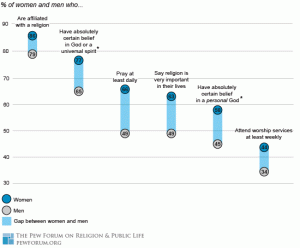A 2009 survey showed the usual difference between men and women in matters of religion.
But the gap seems to be lessening- not that men are becoming more religious, but that women, especially young women, are becoming less.
According to the Washington Post
Over the last four decades, the number of 12th-grade girls who reported never attending church has surged 125 percent. The increase among their male peers was 83 percent. In the late 1970s, 12th-grade boys were 50 percent more likely than girls to say they never go to church, Twenge said. By 2010, that difference had dwindled to 22 percent.
Boys graduating high school in the late 1970s were twice as likely than their female classmates to assert religion was not an important aspect of their lives, according to Twenge’s calculations. By 2010, they were only 39 percent more likely than girls to express disinterest.
Similar trends are visible in Germany and other countries.
From my new book:
Christof Wolf has analyzed the difference between German men and women in terms of religious observance, age, cohort, and population of place of residence. In older cohorts, the differences between men and women are substantial as the members of that cohort age. But in the youngest cohort, the difference between male and female observance disappears in the cities. As a result “the pews, which the women leave behind empty in the Church, are not filled by men. The defeminization of the church is not a ‘re-masculinization.’ It is much more a general detachment from the Church.” In Italy too the historical gap between the sexes is closing. Sandro Magister notes the decline in church attendance among young Italians: “The collapse is so clear that it also wipes out the differences in religious practice between men and women – the latter of whom tend much more to be practicing – typical of previous generations. Among the youngest, very few of the women go to church, on a par with the men.” As attendance at mass approaches zero, the male and female rates are converging.
I suspect the same dynamics are driving the departure of women as drove the departure of men.
Jean Twenge theorizes:
if religion is perceived as a dominating force that restricts freedom and enforces social rules, this will be linked with a decline in religious involvement.
Men left because churches told them to behave and be more like women. This meant giving up male hobbies like homicide and gang rape, but also, in many cases, dancing, sports, fireworks, whistling, etc.
Women, as they move into formerly male-dominated milieus, pick up masculine attitudes, and do not want to be “like women,” that is, stereotypically feminine, any more than men do.
